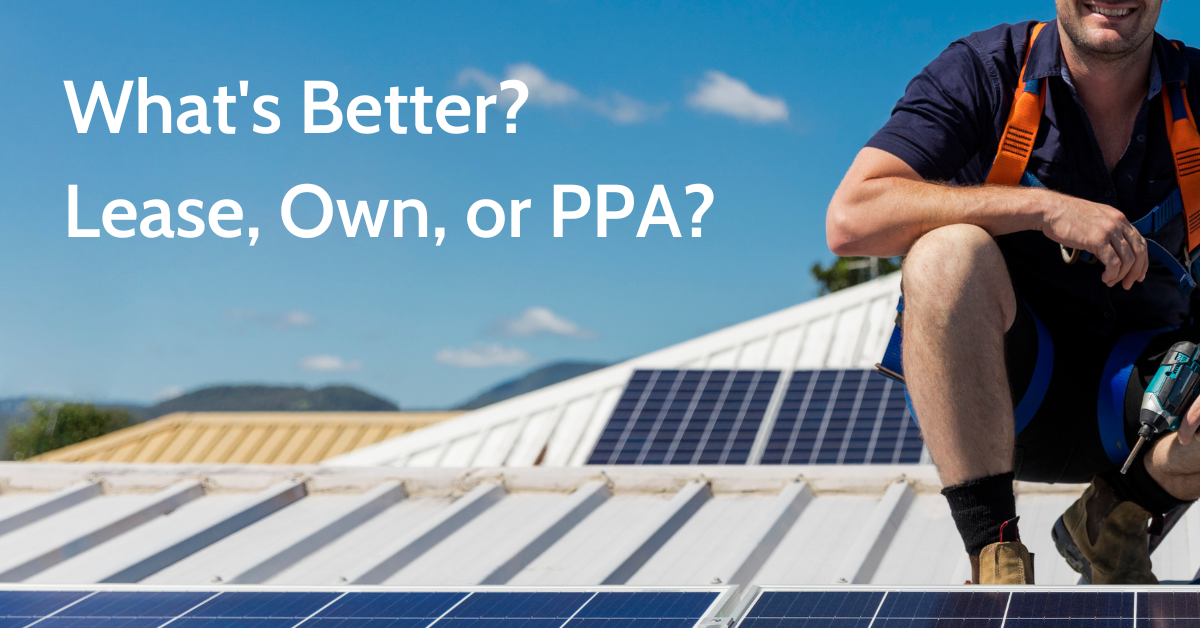
Is it better to buy or lease solar panels?
Are you considering going solar? If so, you may have come across the various options for purchasing solar panels, including leasing, ownership, and power purchase agreements (PPAs). All three options have their own benefits, and it’s important to understand the differences before making a decision.
Leasing Solar Panels
With a lease, you agree to pay a monthly fee to a solar company in exchange for the use of their panels. So you typically pay nothing up front for the solar panels and are just responsible for one low monthly payment. Leasing solar panels is a popular option for those who are solely interested in paying a lower bill compared to their current electric bill. Leases tend to have a lower monthly payment, however, those choosing to lease will not own the panels at the end of the term. So while the monthly savings are still superior compared to the electric bill. Their panels will never be providing “free” power.
Solar panel leases are fully transferable. So if you move to a new home, the new owner can continue the lease or choose to pay off the lease at signing. The solar company is responsible for installing and maintaining the panels, which can be a convenient option for those who don’t want to deal with the hassle of maintenance. However, it’s important to note that you will not own the panels, and you may not be able to take advantage of certain incentives or tax credits that are available to those who own their own panels.
Owning Solar Panels
When you purchase your solar panels, you still typically pay nothing out of pocket and trade your electric bill for a lower payment. However, the main difference between ownership and leasing is that you own your solar panels at the end of the term. So once the panels are paid off, they are producing their own electricity without the need for a monthly payment.
Owning solar panels allows you to take advantage of incentives and tax credits. For example, there is a 30% federal tax credit for going solar. This credit can only be claimed for those who own their solar panels. Keep in mind that you also have to have tax liability in order to take advantage of this 30% federal tax credit. So if you are currently paying taxes, owning solar panels might not be the best option compared to buying or leasing.
Power Purchase Agreements (PPAs)
With a Power Purchase Agreement (PPA), a solar company installs panels on your property and sells you the electricity they produce at a fixed rate. You don’t own the panels, but you do get the benefits of using solar energy without the cost. It’s important to note that the rate you pay for electricity through a PPA is almost always less than the rate you would pay for electricity from your utility company. So if you’re not sure, it’s best to go through all of these options with a professional to see which one is the best fit for you and your home.
Which option is best?
So which option is the best for you? It really depends on your individual circumstances and priorities. If you want to take advantage of incentives and tax credits, ownership may be the way to go. If you don’t want to deal with maintenance after the warranty term and are willing to give up some incentives and credits, leasing or going with a PPA may be better options for you. We can compare the savings for you side by side to help you find the best option. Tell us a little more about your home and situation and we’ll help you compare the options.
No matter which option you choose, going solar is a smart move that can save you money on your electricity bills, reduce your carbon footprint, and increase the value of your home. If you’re considering going solar, now is the time to take the next step. Research your options, contact us for a free quote, and start enjoying the benefits of solar energy!

